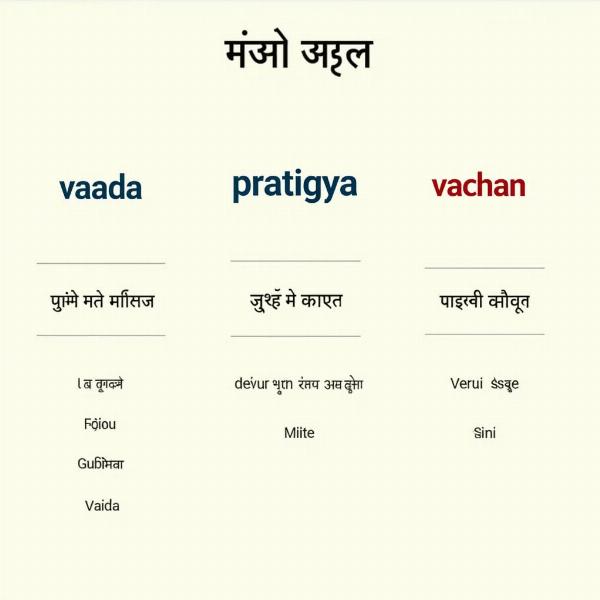Understanding the meaning of “promise” in Hindi is crucial for anyone navigating Indian culture and language. A promise, a commitment to doing or not doing something, holds significant weight in interpersonal relationships, business dealings, and even religious practices. The concept goes beyond a simple agreement; it reflects one’s integrity and honor. Finding the right words to convey this depth of meaning is essential for effective communication.
Exploring the Hindi Equivalents of “Promise”
Several Hindi words effectively capture the essence of “promise.” The most common and versatile is वादा (vaada). It encompasses the general idea of a promise, a commitment, or a pledge. You might hear it used in everyday conversations, like ” मैंने उससे वादा किया था ” (maine usse vaada kiya tha – I promised him/her).
Another commonly used word is प्रतिज्ञा (pratigya). This term carries a more formal and solemn connotation, often associated with oaths or vows. Think of wedding vows or pledges of allegiance. Its gravity makes it suitable for situations demanding a heightened sense of commitment.
वचन (vachan) also signifies a promise but leans towards a more traditional and often religious context. It implies a sacred pledge or a solemn word of honor. You’ll often encounter this word in epic literature or religious scriptures.
 Hindi words for promise
Hindi words for promise
Using “Promise” in Different Contexts
The specific word choice depends heavily on the context. For casual promises, “vaada” is perfectly acceptable. However, for more serious commitments, “pratigya” or “vachan” might be more appropriate. Imagine making a hindi meaning of promise to a friend versus taking a vow in a temple – the context dictates the appropriate terminology.
The Cultural Significance of Promises in India
In Indian culture, promises are deeply intertwined with concepts of honor, trust, and respect. Breaking a promise is considered a serious transgression, damaging one’s reputation and social standing. This cultural emphasis stems from a long tradition of valuing integrity and upholding one’s word.
How do I say “I promise” in Hindi?
You can say “I promise” in Hindi as “मैं वादा करता हूँ” (main vaada karta hun) for masculine or “मैं वादा करती हूँ” (main vaada karti hun) for feminine. For more formal situations, you can use “मैं प्रतिज्ञा करता हूँ/करती हूँ” (main pratigya karta/karti hun).
What if someone breaks a promise in India?
Breaking a promise, or “vada khilafi” (वादा खिलाफी), is frowned upon in Indian society and can severely damage one’s credibility. It’s seen as a breach of trust and can lead to strained relationships.
Is there a difference between a promise and a vow?
While both convey commitment, a “vow” (प्रतिज्ञा – pratigya or वचन – vachan) implies a more formal and sacred pledge, often made in a religious or ceremonial context. A “promise” (वादा – vaada) is more general and can be used in everyday situations.
Why is it important to understand the nuances of “promise” in Hindi?
Understanding the nuances of “promise” in Hindi is essential for effective communication and building strong relationships. It demonstrates respect for the culture and allows you to choose the most appropriate word to convey the intended level of commitment. For instance, understanding the difference between “compromise” (compromise ka hindi meaning) and a firm “no compromise” (no compromise meaning in hindi) can be crucial in negotiations. Similarly, being aware of the negative implications of breaking a promise, like “reneging” (renege meaning in hindi), helps avoid misunderstandings and maintain trust. This understanding becomes even more critical when navigating legal, business, or religious contexts where precise language is paramount.
Conclusion
From casual agreements to solemn oaths, the concept of a promise holds a profound place in Indian society. By understanding the nuances of “promise” in Hindi – from “vaada” to “pratigya” to “vachan” – you can navigate cultural interactions with sensitivity and communicate effectively in various situations. Choosing the right word conveys not just the meaning but also the cultural weight and respect associated with giving one’s word. Remember, i swear hindi meaning also carries significant cultural weight, similar to a promise.
FAQ:
- How do you say “pinky promise” in Hindi? While there isn’t a direct equivalent, you can say “पक्का वादा” (pakka vaada), meaning a firm promise.
- What is the opposite of promise in Hindi? One way to express the opposite of a promise is “वादा खिलाफी” (vaada khilafi) meaning breach of promise.
- Is there a specific ritual associated with making promises in India? While rituals vary, some people might touch their elders’ feet as a mark of respect when making a promise.
- What are some common phrases used to emphasize a promise in Hindi? You can add “कसम से” (kasam se – I swear) or “ज़रूर” (zaroor – definitely) to emphasize a promise.
- Are promises legally binding in India? Some promises can be legally binding, particularly in contractual agreements.
Meaning-Hindi.in offers expert Hindi translation services, specializing in various fields, including business, legal, technical, website localization, and educational document translation. Our team of language professionals ensures accurate and culturally sensitive translations, capturing the nuances of the Hindi language, like the varied meanings of “promise.” We also provide expedited translation services for urgent requests. Contact us at [email protected] or call +91 11-4502-7584 for your Hindi translation needs. Meaning-Hindi.in is your trusted partner for bridging the language gap.